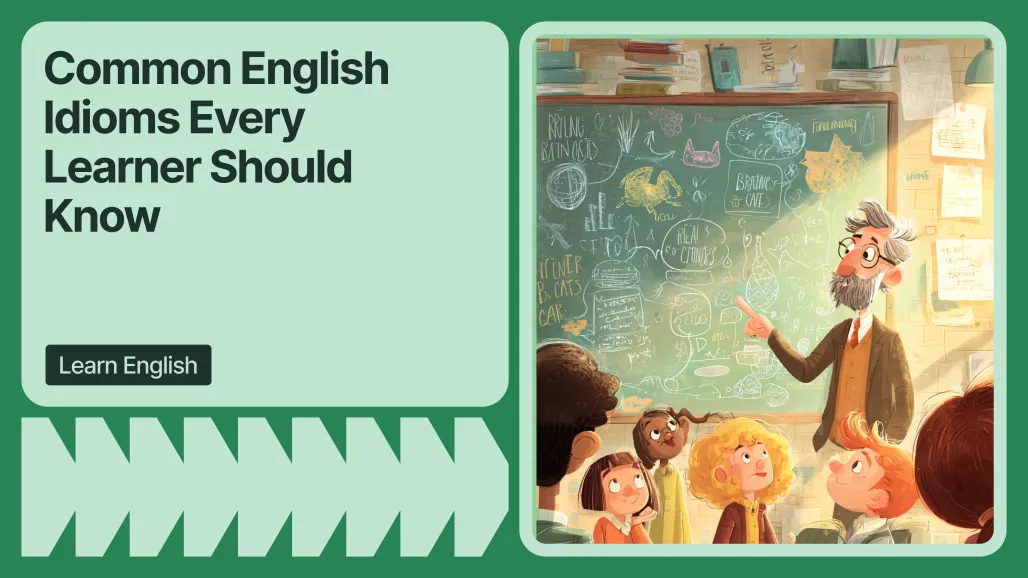Common English Idioms Every Learner Should Know

Learn 15 common English idioms with simple meanings and classic book examples to help you speak more naturally and confidently.
1. Break the ice
2. Hit the books
3. Under the weather
4. Bite the bullet
5. Let the cat out of the bag
6. Spill the beans
7. Cost an arm and a leg
8. Piece of cake
9. Once in a blue moon
10. Kick the bucket
11. Hit the nail on the head
12. Add fuel to the fire
13. Pull someone’s leg
14. Go the extra mile
15. Burn the midnight oil
When and How to Use Idioms
Idioms are phrases that don’t always make sense word by word—but they are used all the time by native speakers! If you want to sound more natural in English, learning idioms is a great step.
Here are 15 useful English idioms, explained in simple words—with real examples from classic books!
1. Break the ice
Meaning: Start a conversation in a friendly way
Example: “She told a joke to break the ice at the party.”

2. Hit the books
Meaning: Start studying hard
Example: “I need to hit the books tonight. The test is tomorrow!”
3. Under the weather
Meaning: Feeling sick
Example: “I’m feeling a bit under the weather today, so I’ll stay home.”

4. Bite the bullet
Meaning: Do something difficult or unpleasant
Example: “He didn’t want to apologize, but he bit the bullet and said sorry.”

5. Let the cat out of the bag
Meaning: Reveal a secret by mistake
Example: “She let the cat out of the bag about the surprise party.”

6. Spill the beans
Meaning: Tell a secret
Example: “Come on, spill the beans! What happened at the meeting?”

7. Cost an arm and a leg
Meaning: Very expensive
Example: “That coat looks nice, but I bet it cost an arm and a leg.”

8. Piece of cake
Meaning: Very easy
Example: “That test was a piece of cake!”
9. Once in a blue moon
Meaning: Something that happens very rarely
Example: “I only go to the cinema once in a blue moon.”

10. Kick the bucket
Meaning: Die (used humorously)
Example: “The old man finally kicked the bucket.”

11. Hit the nail on the head
Meaning: Say exactly the right thing
Example: “You hit the nail on the head—that’s exactly how I feel!”

12. Add fuel to the fire
Meaning: Make a bad situation worse
Example: “Yelling at her just added fuel to the fire.”
Inflames the towns of Scotland, but the English
Add fuel to the fire: this raging hate
Will never be extinguished

13. Pull someone’s leg
Meaning: Joke or tease someone
Example: “Relax, I’m just pulling your leg!”

14. Go the extra mile
Meaning: Do more than expected
Example: “She went the extra mile to help the new student.”
15. Burn the midnight oil
Meaning: Stay up late working or studying
Example: “He burned the midnight oil to finish his report.”

When and How to Use Idioms
Idioms are casual and colorful, so they are great for:
- Speaking with friends
- Telling stories
- Showing emotion or humor
- Writing informal emails or messages
But be careful! Idioms are usually not used in:
- Formal writing (like school essays or business reports)
- Very serious conversations
- Speaking with people who don’t speak English well (they may not understand)
Use idioms naturally—one or two in a conversation is enough. You don’t need to fill every sentence with them!
Tip: Listen to how native speakers use idioms in movies, TV shows, and books. This helps you learn when it sounds natural.
Idioms are fun—but they can be tricky! Don’t try to learn all of them at once. Read, listen, and when you hear one, try to guess the meaning. The more you use them, the more natural they’ll feel!